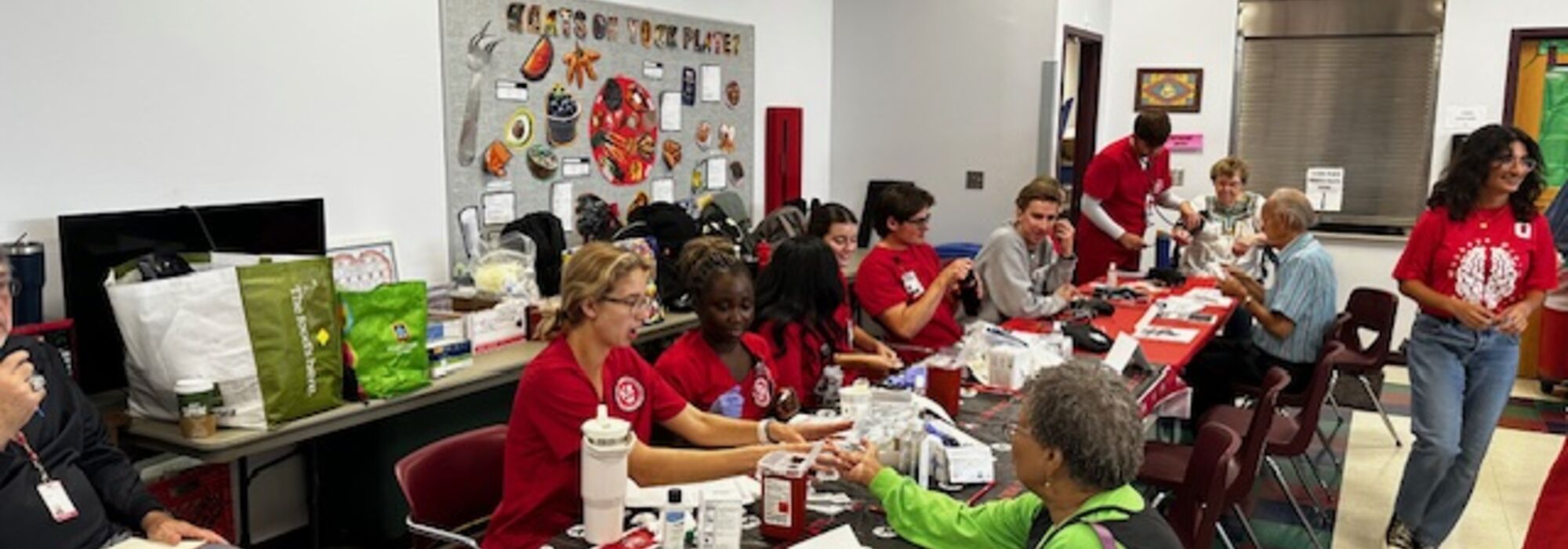
Brain Health Fair
Pictured above: Ohio State nursing students providing health screenings including blood pressure and glucose monitoring.
by Melissa L. Weber
The third annual Brain Health Fair was held in September at the Gillie Recreation Center in Columbus. The event is the largest project of ADHOC, the Alliance for Diversity in Brain Health for the Central Ohio Community, which includes the African American Alzheimer’s and Wellness Association (AAAWA), the Central Ohio Chapter of the Alzheimer’s Association, and the Center for Healthy Aging, Self-Management and Complex Care in the College of Nursing. These organizations work together to provide resources and information to community members who are typically underserved by the medical community.
ADHOC received recognition this year from the Ohio State Office of Outreach and Engagement as a Program of Excellence in Engaged Scholarship. The Golden Buckeye Center for Dementia Caregiving at the College of Nursing is another ADHOC partner that provides services to community caregivers.
During the Fair, Associate Professor Kathy Wright, PhD, RN, APRN-CNS, PMHCNS-BC, FNAP, FAAN, recruited participants for her study on improving self-care for Black women caregivers. Her research looks at ways to manage stress and reduce cardiovascular risk for caregivers of patients with all types of dementia.
“We need to build bridges to reduce disparities in dementia care and caregiving,” said Karen Moss, PhD, RN, CNL, FNAP, assistant professor in the College of Nursing. Moss’s research is focused on Pair 2 Care©, a peer support intervention for Black family caregivers of people living with dementia. Moss emphasized that the three most important things you can do to protect your brain are to get regular exercise, follow guidelines for good nutrition and avoid isolation.
The activities at the event brought those ideas into focus for all participants. A local DJ played tunes for the crowd and encouraged them to dance. Other activities included modified Tai Chi for people with limited mobility, showing exercises you can do while seated.
A panel discussion that included an attorney and an expert in elder abuse explained the difference between power of attorney and guardianship. Audience members were encouraged to beware of scams, understand their rights and know who to contact for help.
“Up to seven million people in the U.S. have Alzheimer’s,” said Pamela Myers, MAOM, BSN, RN, senior director of programs for the Alzheimer’s Association. “That usually means three to five caregivers per person living with dementia are also involved. Many people don’t know there are new medications that can slow progression of the disease, but they have to be given early.”
Her organization helps people recognize warning sings to encourage them to see a physician for diagnosis and treatment.
Kimberly Wilson-Lawson, executive director of AAAWA, helps families navigate memory screening and find resources when needed. They are currently supporting about 75 families. She also encourages the use of Yuka, an independent smartphone app that provides nutrition information on foods to know how additives and other ingredients may affect your health.
The Brain Health Fair also included blood pressure and glucose screenings with students from the College of Nursing and information from numerous other organizations focused on supporting healthy aging.
In this Issue
- DNE: The Change Agents
- Clinician Well-Being Summit
- From Lab to Life
- Expanding Community Care
- Reaching out to Taiwan
- Buckeye Inspiration: David Hiatt
- Brain Health Fair
- Grants Roundup
- Student Life: Isabelle Meehan
- Connecting Young People in Crisis to Health and Hope
- Alumni in Action: Jeri Milstead
- Putting Our Heads Together for Brain Health

